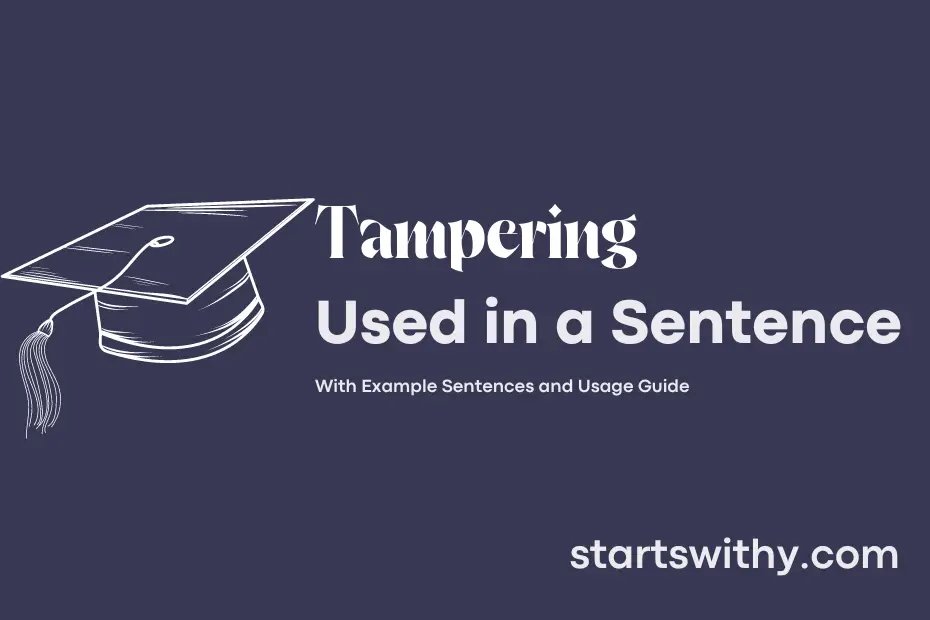Have you ever wondered what “tampering” really means? Tampering refers to the act of interfering or making unauthorized changes to something, often with the intention of altering the expected outcome or results.
In various contexts, tampering can have serious implications, such as tampering with evidence in a criminal investigation or tampering with a sealed product. Understanding the consequences of tampering can help deter individuals from engaging in such activities.
7 Examples Of Tampering Used In a Sentence For Kids
- Tampering with your toys is not safe.
- Don’t tamper with the switches at home.
- It’s not good to tamper with the TV buttons.
- Always ask an adult if you see someone tampering with things.
- Remember, tampering with electrical items can be dangerous.
- If you see someone tampering with the plants, tell a grown-up.
- Stay away from anyone who is tampering with the school equipment.
14 Sentences with Tampering Examples
- Tampering with your attendance record could result in serious consequences.
- It is important to avoid tampering with your grades to maintain academic integrity.
- Tampering with official documents can lead to legal trouble.
- Cheating in exams by tampering with answer sheets is unethical.
- Altering your resume by tampering with information can impact your career opportunities.
- It is advisable to refrain from tampering with research data to maintain credibility.
- Engaging in tampering with college applications is dishonest and can lead to rejection.
- Plagiarism is a form of tampering with someone else’s work without giving credit.
- Falsifying experiment results by tampering with data is unacceptable in scientific research.
- Tampering with scholarship applications can lead to disqualification.
- Modifying someone else’s project work without consent is considered tampering.
- Professors have a zero-tolerance policy for tampering with exam papers.
- It is essential to report any instance of tampering with academic records to the authorities.
- Submitting someone else’s work as your own by tampering with authorship is unethical.
How To Use Tampering in Sentences?
Tampering is when someone interferes with something in a way that is not allowed or not authorized. In a sentence, the word tampering is used to describe actions that involve altering or manipulating something in a dishonest or inappropriate manner.
Here is a simple guide on how to use tampering in a sentence:
-
Identify the context: Determine the situation where someone is altering or interfering with something improperly.
-
Choose the subject: Decide who or what is doing the tampering. This could be a person, group of people, or even an object.
-
Select the object: Think about what is being affected by the tampering. This could be anything from evidence to electronic devices.
-
Form the sentence: Combine the subject, action, and object to create a sentence that clearly conveys the act of tampering. For example, “The employee was caught tampering with the security cameras”.
-
Check for clarity: Make sure that the sentence clearly communicates the idea of unauthorized interference or manipulation.
By following these steps, you can effectively use the word tampering in a sentence to describe situations where someone is altering something in a deceptive or unauthorized manner.
Conclusion
In conclusion, tampering with evidence, documents, or data is a serious offense that can have severe consequences. The act of altering or interfering with information in an unauthorized manner can compromise the integrity and credibility of investigations, legal proceedings, and scientific research. For example, sentences with tampering can range from fines and probation to imprisonment, depending on the gravity of the offense and the laws in place.
It is crucial for individuals and organizations to uphold ethical standards and adhere to legal regulations to prevent any form of tampering. By maintaining transparency and honesty in handling information, we can uphold the principles of justice, fairness, and accountability in our society.



